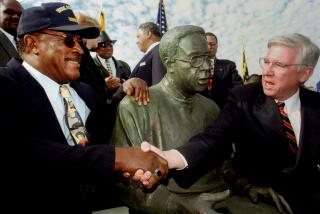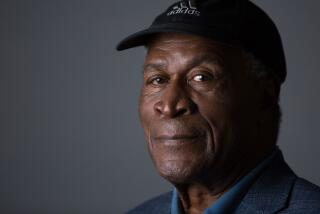Alan Manson, 83; Soldier Turned Actor
- Share via
Alan Manson, one of a host of World War II soldiers recruited to appear in Irving Berlin’s 1942 musical and subsequent movie “This Is the Army,” who went on to act on Broadway, television and film, has died. He was 83.
Manson died of undisclosed causes on March 5 in New York City’s Jamaica, Queens, neighborhood.
For the record:
12:00 a.m. March 14, 2002 FOR THE RECORD
Los Angeles Times Thursday March 14, 2002 Home Edition Main News Part A Page 2 A2 Desk 1 inches; 20 words Type of Material: Correction
Manson obituary--In an obituary of actor Alan Manson in Tuesday’s California section, the name of composer Richard Rodgers was misspelled.
Obviously delighted with his assignment, then Sgt. Manson portrayed a stiff interlocutor in the first part of Berlin’s historic morale-boosting stage revue. In the second half, he dressed in drag as “Jane Cowl” in the Stage Door Canteen production.
He kept in touch with other members of the Army troupe, one of the first integrated units in the military, long after they played Broadway, toured the nation and the world with the popular show.
In its three-year run, the show raised $15 million for the Army Emergency Relief Fund. The 1943 film version starred future U.S. Sen. George Murphy as the father of future president Lt. Ronald Reagan.
The Broadway cast members proved so popular with Eleanor Roosevelt that she invited them to Washington to perform for her husband. After the presentation at the National Theater on Oct. 8, 1942, Manson recalled the thrill of meeting their commander in chief, President Franklin D. Roosevelt.
“It was a night none of us will ever forget,” he later told Berlin biographer Laurence Bergreen. “Roosevelt ... stayed up until 1:30 in the morning, shaking hands with all 359 men in the company. Mrs. Roosevelt and Harry Hopkins were there. No one could go to sleep after that. We just sat up talking about it.”
Manson went on to perform in the hit Broadway revue “Call Me Mister,” Rogers and Hammerstein’s “Allegro” and “Angels Kiss Me.” But in 1955, his stage career hit a snag when he was called before a House committee investigating communists in New York theater.
Invoking the 1st, 5th and 9th amendments and his belief in privacy, Manson refused to answer any questions. “I feel that these matters lie within a province that is hallowed,” he said, “and that I spent five years in the Army for.”
Although he was later cleared, Manson found so little work as an actor for a few years that he was forced to earn his living as a tour guide. In 1959, he returned to the boards in Paddy Chayefsky’s “The Tenth Man,” then “Gideon.”
But for the last four decades, Manson devoted himself primarily to character roles in television and motion pictures, often portraying an authority figure such as a judge.
He had a regular role in the soap opera “The Edge of Night” for many years, and appeared in such popular series as “M*A*S*H,” “Kojak,” “McMillan and Wife,” “The Bob Newhart Show,” “The Rockford Files,” “Three’s Company,” “Columbo” and “Law & Order.”
Manson is survived by his wife of less than a year, Corey Rose Lang, and his brother, Arthur.
More to Read
The biggest entertainment stories
Get our big stories about Hollywood, film, television, music, arts, culture and more right in your inbox as soon as they publish.
You may occasionally receive promotional content from the Los Angeles Times.










